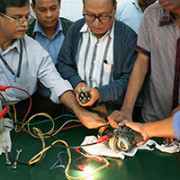Economics
 Infrastructure, Regional cooperation and integration
Infrastructure, Regional cooperation and integration
 Economics, Finance sector development
Economics, Finance sector development
 Economics, Regional cooperation and integration
Economics, Regional cooperation and integration
 Economics
Economics
 Industry and trade, Regional cooperation and integration
Industry and trade, Regional cooperation and integration
 Education
Education
 Infrastructure
Infrastructure
 Infrastructure, Social development and protection
Infrastructure, Social development and protection
 Health
Health

Kuroda should rethink the quest for 2 percent inflation

The Bank of Japan had a difficult start into 2016. The latest data shows that inflation in the last quarter of 2015 was lower than expected. Furthermore, doubts are increasing about the recovery of the economy. At the end of January, BOJ Gov. Haruhiko Kuroda surprised markets by announcing negative interest rates for certain commercial bank deposits at the BOJ. On March 1 Japan started to sell government bonds with a yield below zero. Market observers expect even bolder steps later this year.
Boosting South Asia integration through the realization of dream projects

Despite strong linkages in the past during the colonial period and strong ethnic and traditional ties, South Asian countries have become increasingly more diverse since their independence. While they are geographically closely connected, this does not mean that they are well integrated. Countries in the region have vastly different sizes, populations, and topography, and there are significant differences in their economies and income per capita. The conditions, however, might be ripe for a boost in regional integration. Implementing highly visible and symbolic transport connectivity projects, which have long been considered as dream realizations, would trigger the acceleration of regional integration for the benefit of all.
Budgeting data gaps and fiscal policy debate

Singapore has regularly reported considerable surpluses in its annual fiscal budget. Budget surpluses have been an essential part of the country’s growth strategy (Asher et al. 2015) as they are perceived to provide a signal of sound public sector financial management to foreign investors, key stakeholders in Singapore’s development planning. Budget surpluses also enable the corporate income tax rate to be kept among the lowest in the world, at 17%. Other policies—such as having a relatively large inflow of foreign workers that depresses at the lower end and almost no taxes on most forms of capital gains and domestic interest income—contribute to the high share of capital income in national income at around 55%, with labor’s share at around 40%–42%, in contrast to the pattern in OECD countries.
Learning from firms in East Asian production networks

Slowing growth in the Peoples Republic of China (PRC) – the world’s second largest economy – is grabbing the headlines with some suggesting a third wave of the 2008 global financial crisis. While this topic deserves attention because of its global economic implications, there is insufficient analysis of firms in global production networks (GPNs), which were at the forefront of the economic transformation in PRC and the rest of East Asia, and lessons for latecomers to GPNs.
The PRC’s growth prospects

The PRC’s diminished growth prospects have figured prominently in recent commentaries about global economic conditions and world stock markets (e.g. Frankel 2016). The general view, with which I concur, is that the PRC will grow in the future at a much slower rate than it has in recent decades. This growth slowdown will reduce international trade and has probably contributed already to the depression in oil prices (Blanchard 2016).
A snapshot of e-commerce in Central Asia

In 2015, Central Asia made some important improvements in the environment for cross-border e-commerce: Kazakhstan's accession to the World Trade Organization (WTO) will boost commercial transparency, while the Kyrgyz Republic’s membership in the Eurasian Customs Union expands its consumer base. Why e-commerce? Two reasons. First, e-commerce reduces the cost of distance. Central Asia is the highest trade cost region in the world: vast distances from major markets make finding buyers challenging, shipping goods slow, and export prices high. Second, e-commerce can help pull in populations that are traditionally under-represented in export markets such as women, small businesses and rural entrepreneurs.
CET funding strategy for vulnerable workers

Research has demonstrated that in general, training has a positive impact on an individual’s labor market performance: wages grow faster after training, training has positive impact on employment security, and training increases the probability of re-employment after job loss. A recent adult skills survey released by the Organisation for Economic Co-operation and Development (OECD) in 2013 re-emphasized that adult learning or continuing education and training (CET) can play an important role in the development and maintenance of key information skills and the acquisition of other knowledge and skills that are necessary for keeping pace with the changing work environment.
South Asia could be linchpin for regional integration

As the world deals with the "new normal" of a slowing China, regional financial and economic integration is more important than ever, and South Asia is strategically poised to play an influential part. There are several reasons why it is time to take a fresh look at the potential bridging role of South Asian economies in Asian integration. First, the South Asian economies -- which comprise India, Pakistan, Bangladesh, Sri Lanka, Nepal, the Maldives, Afghanistan and Bhutan -- have a largely untapped market of about 1.7 billion people, and they belong to the South Asian Free Trade Area.
On the unintended consequences of housing policies: A cautionary tale of three developed countries

Lack of affordable housing is a serious policy concern in many countries. In large prosperous cities such as London, New York, Beijing, or Tokyo, the affordability crisis is particularly acute. In these cities, households often live in excessively expensive and crammed spaces. Homeownership remains an unachievable dream for many. Not surprisingly, voters in these places pressure politicians into implementing policies that tackle the crisis.
5 reasons to be worried about health security in Asia

If you live in Asia and the Pacific, do you ever wonder how high your risk is of contracting antimicrobial-resistant bacteria or emerging infectious diseases such as a new strain of avian influenza? Unfortunately, I have to tell you that the risk here is higher that in any other region in the world.


Search
Subscribe / Connect to Asia Pathways
Subjects
- Agriculture and natural resources
- Blog
- Capacity development
- Climate change
- Economics
- Education
- Energy
- Environment
- Finance sector development
- Gender
- Governance and public sector management
- Health
- Industry and trade
- Information and Communications Technology
- Infrastructure
- Miscellaneous
- Population
- Poverty
- Private sector development
- Regional cooperation and integration
- Sanitation
- Social development and protection
- Transport
- Uncategorized
- Urban development
- Video Blog
- Water
Recent Posts
- Artificial intelligence: A new driver for inclusive growth and development?
- Increasing trust in cross-border e-commerce and artificial intelligence
- Enhancing access to maternal and newborn healthcare in developing Asia
- Can electric vehicles lead the way to a sustainable future?
- Mitigating climate-related sovereign risk to accelerate action on the climate emergency




Recent Comments